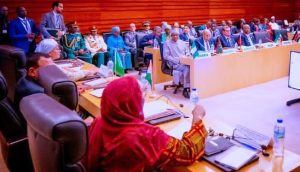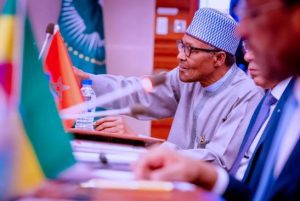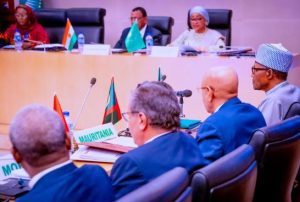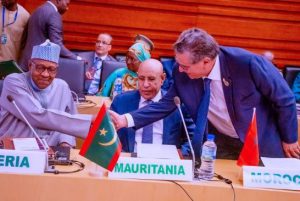President Muhammadu Buhari has stated that Nigeria is prepared to host the Secretariat of the Sahel Climate Fund, including the provision of equipment and housing for the fund’s top management staff.
The “Sahel Climate Fund” is the Sahel Region Climate Commission’s financial arm (SRCC).
The body is one of three climate commissions for Africa established in Marrakech, Morocco in 2016 at the Summit of African Heads of State and Government organized at the initiative of Morocco’s King on the sidelines of the UN Framework Convention on Climate Change’s 22nd Conference of the Parties (COP22).

Speaking on Friday at the 2nd SRCC Heads of State and Government Meeting during the 36th AU Summit in Addis Abeba, the President stated that Nigeria, as an active member of the Commission, will support the secretariat’s operationalization in order to effectively implement climate change activities in the region.
He expressed concern that the availability and access to funds for climate change activities, particularly adaptation, continue to be major issues for the African region.

As a result, President Buhari described the Sahel Climate Fund as an additional financial resource that is adequate and predictable for carrying out the requirements of the Climate Change Convention and the Paris Agreement.

According to the Nigerian leader, the Fund will, among others, serve as a gateway to climate finance and investment strategy, finance the implementation of National Determined Contributions (NDCs) of member states and ensure effective participation of the Sahel Region in the global effort to curb greenhouse gas (GHG) emissions.

The Fund is also expected to mobilize required resources from member states, bilateral and multilateral partners, and private financial institutions.
‘‘Understanding the barriers to accelerated climate finance inflows and our climate related sectors, are perceived to be high risk investment destinations due to multilayered operational risks, the Sahel Climate Fund will serve as a gateway to climate finance and investment strategy that considers innovative and practical ways to overcome multiple risk impediments and sustainable financial support to Sahelian Countries.

‘‘In addition, the Sahel Climate Fund will be the necessary Climate Finance Mechanism that will be instrumental in financing the implementation of the NDCs of member states, contribute to strengthening the adaptation and resilience capacities of local communities along with their livelihoods, and ensure effective participation of the Sahel Region in the global effort to curb GHG emissions.
‘‘The Sahel Climate Fund will mobilize the necessary resources from member states, bilateral and multilateral partners, and private financial institutions to foster cooperation and coordinated actions among Sahel Region Climate Commission member countries to address climate change.”
He underscored the need for urgent and extensive action as well as broad international participation required to tackle climate change in Africa.
In a text distributed at the Summit, King Mohammed VI of Morocco warned that extreme weather events will directly threaten 118 million people in Africa by 2030.
The Moroccan leader pledged his country’s support for the Commission, saying his country has honored its commitments made at the inaugural conference by providing the Commission with “capacity building, technical assistance, and financial support for the preparation of feasibility studies to finalize its Climate Investment Plan.”
The Sahel geo-climatic region comprises 17 countries stretching from the Atlantic to the Red Sea, including Nigeria, Benin, Burkina Faso, Cameroon, Cape Verde, Côte d’Ivoire, The Gambia, Guinea Conakry, Djibouti, Ethiopia, Eritrea, Mali, Mauritania, Niger, Senegal, Sudan and Chad.





